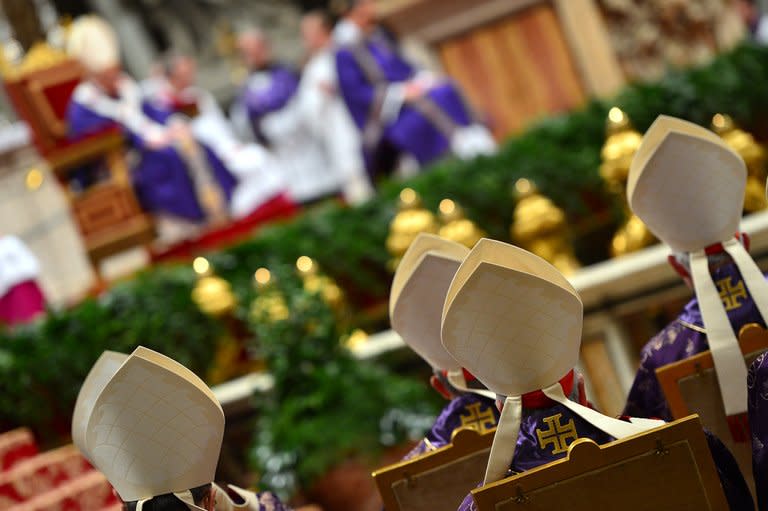Vatican may call early conclave for next pope
The Vatican said it could speed up the election of a new pope as lobbying for Benedict XVI's job intensified amid speculation over who had the best chance to succeed him. Vatican spokesman Federico Lombardi, who earlier said the conclave would probably start on or after March 15 after the pope resignsthe pope resigns on February 28, said the issue of bringing forward the date "has been raised by various cardinals". Benedict's decision to step down for age reasons has revealed tensions at the heart of the Church, emphasised by a battle between top cardinals over whose candidate should be appointed to head up the Vatican's scandal-hit bank. The choice of German financier Ernst Von Freyberg on Friday was seen by some as a snub to the Vatican's powerful number two, Secretary of State Cardinal Tarcisio Bertone, who had backed another candidate, religious watchers said. "The appointment is fruit of a bitter compromise," Il Messaggero daily said. It appeared to bring to the fore a power struggle between Bertone's allies and his rivals reminiscent of Renaissance conspiracies -- a bid to shape the hierarchy within the Vatican first revealed in a leaks scandal last year. In an interview carried out 10 weeks ago but published Saturday, Benedict spoke about the scandal, which some believe was a factor in his resignation. "I simply couldn't understand it," he told his biographer Peter Seewald in the interview published in Focus magazine, referring to his former butler Paolo Gabriele's decision to leak secret memos revealing intrigue at the Vatican. "I don't know what he was expecting. I can't understand his thought process," said the 85-year-old, who pardoned Gabriele just before Christmas. Sources at the Vatican told Ansa news agency that Gabriele will in the next few days sign a confidentiality agreement with the Vatican, assuring the Church that he will not speak out to the media about his life as Benedict's butler. Seewald had also asked Benedict six months ago what people could expect from the rest of his papacy: "From me? Not much. I am an old man, running out of energy. I also think what I have done is enough," he replied. In one of his last private audiences, Benedict met Guatemala President Otto Perez, who described to AFP "a humble pope" who told him he was "conscious of the responsibility of his decision" which he had taken "to serve the whole world and humanity." "He told me he understood the obligations of being a pope and said it was very difficult to take this decision. He asked for the wisdom of God, but in the end decided to give way to someone else," he said. On Saturday, Vatican spokesman Federico Lombardi said that once Benedict steps down, he will stay in the papal summer seat in Castel Gandolfo near Rome for around two months before moving to a monastery within the Vatican walls. He is expected to take some of his current household to the modern monastery, which is currently undergoing restoration works. Thousands of faithful are expected to flock to St. Peter's Square on Sunday to pay tribute to the German pontiff in one of his last public appearances. The Osservatore Romano, the Vatican's newspaper, Saturday printed a front-page tribute to the pope from Israeli President Shimon Peres, who hailed the resignation as an "original decision by a courageous and original man." The secret conclave set to meet under Michelangelo's famous frescoes in the Sistine Chapel to select a new pope had been scheduled for mid-March, but could be brought forward as long as cardinals from around the world are in Rome. Rules laid down by John Paul II stipulate that between 15 and 20 days must pass after the end of the pontificate before the conclave meets. But a clause in the constitution allows exceptions in case of an agreement between the cardinals, who are already gathering at the Vatican. Most are expected at a final audience with Benedict on February 28. As speculation increased over who the next pope might be, Italian cardinal elector Velasio De Paolis called for European candidates not to be ruled out even though most believers now live in Asia, Africa and Latin America. "The conclave will vote on the basis of the person, not where they come from. Despite the crisis of faith, Europe still has a lot to give to the Church," he said in an interview with La Stampa daily. Of the current 118 cardinal electors, 117 will partake in the conclave as Ukrainian Lubomyr Husar will turn 80 two days before the pope retires, making him ineligible to vote for his successor. Sixty-one of the cardinals are European -- 28 of whom are Italian -- while 19 come from South America, 14 from North America, 11 from Africa and 11 from Asia and one from Oceania. Whether the next pope might be one of the younger candidates or come from a part of the world where Christianity is on the rise has fed a frenzy of conjectures in the international media over the possible front-runners. "We have to choose someone who can best guide the Church and serve the cause of the faith, not whoever has best conquered the mass media or has the most captivating external image," said De Paolis.





